Bachelor of Arts Program Advice
Understanding your Bachelor of Arts (BA) Program
Watch this short video to get up to speed on the program structure and rules of the BA to ensure you’re on track with your planning.
View video transcript and links online here.
The information below further explains some of the terms used and requirements of your Bachelor of Arts program.
Programs, Courses and Units
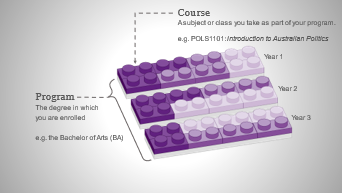 At UQ we refer to your degree as a program and a subject as a course.
At UQ we refer to your degree as a program and a subject as a course.
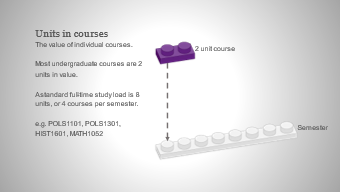 Courses
Courses
Most UQ courses are 2 units in value.
If you are a full-time student you will undertake 8 units (4 courses) each semester. In the BA, the first 8 units (4 courses) you enrol in must be from courses included in the BA Course List (courses listed under BA Majors, Extended Majors or Minors).
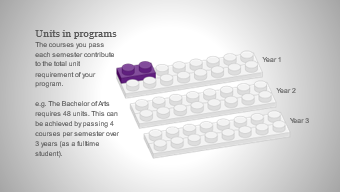 Units
Units
To complete the BA program you must successfully complete 48 units, which usually equates to 24 courses.
As you progress you will complete courses at Level 1, Level 2 and then Level 3. You can select up to 24 units of courses at Level 1 to count towards your BA.
Majors and Minors
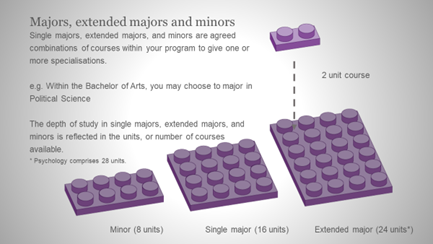
Some of the courses you complete will form your extended major, majors or minor.
The key difference between majors, extended majors and minors is how many courses you will need to take from those disciplines to complete them.
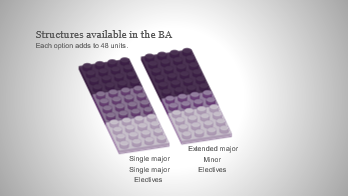
Within the BA. You can choose from one of two structures:
- Two single majors
- One extended major and a minor
You can only select up to only 32 units of the same discipline descriptor (e.g. POLSXXXX or HISTXXXX).
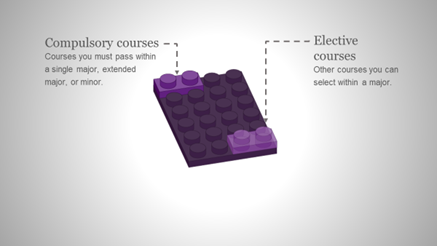 Within your major, there are compulsory courses, which you must pass to complete your major, and elective courses, which you can select to form the rest of your major.
Within your major, there are compulsory courses, which you must pass to complete your major, and elective courses, which you can select to form the rest of your major.
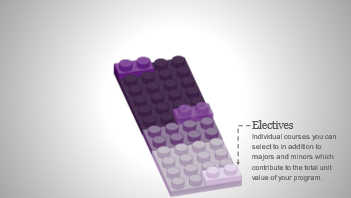 The final element to your BA is your general electives. These are individual courses of your choice that can be selected from the BA course list or other undergraduate course lists. Students enrolled in a BA program will usually complete 16 units of electives.
The final element to your BA is your general electives. These are individual courses of your choice that can be selected from the BA course list or other undergraduate course lists. Students enrolled in a BA program will usually complete 16 units of electives.
Make sure you read the program requirements to ensure you understand the requirements of your degree.
Planning your Program
At UQ, a standard full-time workload is 16 units over the year – this breaks down to 8 units (or four courses) each semester.
Please use the PDF below for the year in which you commenced your Bachelor of Arts (BA) program to draft an enrolment plan. This planner should be read in conjunction with your program requirements (select your year of commencement from the dropdown box).
- 2026
- 2025 (updated March 2025)
- Semester 1 and 2, 2024
- Semester 2, 2023
You don’t have to decide what courses you want to do for your whole program at the start of your first semester – we only ask you to choose courses one year at a time.
So, all you need to worry about at this stage is choosing four courses for your first semester and second semester, taking into account all compulsory core courses.
The Starting at UQ website provides a guide for completing your enrolment.
International Students with Credit Arrangements
Please see the Study Plans section of our International Students webpage.
Transferring
Transferring from the BA to another UQ degree
You can transfer from the BA into one of the below programs, and some of them can be studied alongside your BA. The below planners have been designed to assist students looking to commence study in 2026 and transfer programs in 2026 or 2027:
- Bachelor of Arts to Bachelor of Occupational Therapy (Honours)
- Bachelor of Arts to Bachelor of Physiotherapy (Honours)
- Bachelor of Arts to Bachelor of Psychological Science (Honours)
- Bachelor of Arts to Bachelor of Speech Pathology (Honours)
- Bachelor of Arts to Bachelor of Science
- Bachelor of Arts to Bachelor of Economics
- Bachelor of Arts to Bachelor of Business Management
- Bachelor of Arts to Bachelor of Commerce
- Bachelor of Arts to Bachelor of Laws (Honours)
To transfer from the BA to another undergraduate program within the Faculty, please seek advice from our Student Administration team.
- Bachelor of Advanced Humanities (Honours)
- Bachelor of Arts - Dual Program
- Bachelor of Arts
- Bachelor of Communication
- Bachelor of Criminology and Criminal Justice
- Bachelor of Education (Primary)
- Bachelor of Education (Secondary) - Dual Program
- Bachelor of Humanities/Bachelor of Laws (Honours)
- Bachelor of International Studies
- Bachelor of Journalism
- Bachelor of Music
- Bachelor of Social Science
